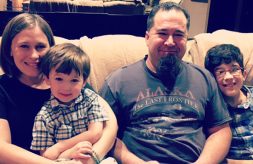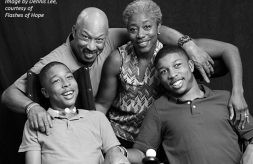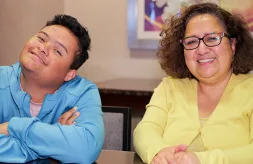Zayd’s Family
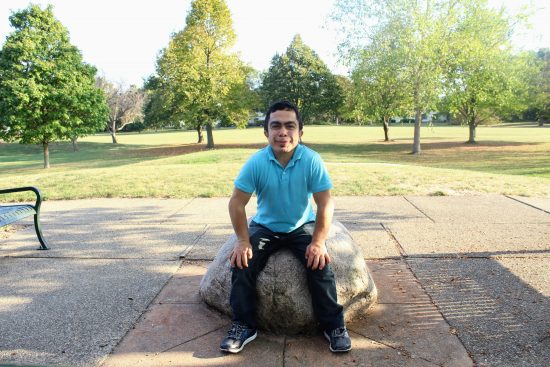
“(DSCC Care Coordinators and staff) were a shoulder to lean on. They showed that they genuinely cared about my well-being as I was growing up and through school. They really showed a lot of love and support for all of the hard things that we were going through."”
— Former participant Zayd Jawad
“These are people who really cared about me.”
Growing up with a rare disease can seem like an endless string of doctor’s appointments, painful procedures, puzzled expressions from providers and a lack of answers.
Zayd Jawad knows these feelings all too well. The 21-year-old was born with Hunter syndrome, a lysosomal storage disorder that affects his bodily systems and physical growth and development.
The University of Illinois at Chicago’s Division of Specialized Care for Children (DSCC) was a constant presence throughout his childhood and adolescence, providing much-needed reassurance to Zayd and his parents.
“They were a shoulder to lean on. They showed that they genuinely cared about my well-being as I was growing up and through school. They really showed a lot of love and support for all of the hard things that we were going through,” Zayd said.
“As you’re growing up as a kid and going to all these different appointments and it takes so much of your time, you think, ‘That’s all there is to life,’” Zayd said. DSCC’s interest and support of his goals and life outside of the doctor’s office made him feel “more like a whole person.”
This support gave Zayd hope. It also inspired him to share his story as an adult and promote the importance of patient-centered care in the healthcare field.
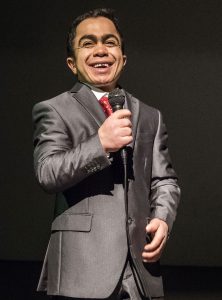
“I have the ability to connect with people and I can use it to help people.”
“Everything was going to be OK”
Zayd was diagnosed with Hunter syndrome at age 5. The genetic disorder means his body is missing a key enzyme for his cells to function properly. The breakdown in function causes progressive damage to his lungs, heart and other organ systems. The missing enzyme also affects his hearing, mobility and immune system and has stunted his growth.
“I’m fun-sized. I’m good for traveling,” Zayd jokes about his 4-foot, 10-inch frame.
The Jawad family first enrolled with DSCC around 2003 to help cover the cost of Zayd’s hearing aids. Their Care Coordinator soon became a lifeline for the family.
“The biggest thing DSCC has done was giving guidance through a very complicated arena of people, places and payment. For example, they’d help us pay for services, but they’d also help refer us to services, such as orthopedic surgeons or therapies, and they referred us to ones they thought would be the best fit for me,” Zayd said. “Because of my condition and how rare it is, it was hard to find those providers.”
When Zayd turned 10, DSCC helped the Jawad family sort through insurance options so Zayd could receive regular enzyme replacement therapy, which he continues today. The therapy doesn’t cure his disease but slows down the effects, improving his quality of life.
“They took our hands and walked us through those complicated processes of insurance,” Zayd said. “When I started getting my enzymes, it’s one of the most expensive medications in the world. We had absolutely no idea how we could pay for it.”
Zayd said his Care Coordinator was like a second mother to him. And most importantly, she helped relieve his parents’ anxieties and fears and provided a partner they could trust.
“Children are really affected by their parents, and I felt more at ease because they had support and much less tension in the household because of DSCC,” Zayd recalled. “These are people who really cared about me and they made me feel like everything was going to be OK.”
“My story is important”
This personal connection was important to Zayd, especially since he often felt socially awkward and isolated from his peers during high school. After graduation, he enrolled at the local community college and took a public speaking class. He immediately found his passion and a newfound confidence.
Soon after, he received an invitation from his high school to be the keynote speaker for their disability awareness month.
“When I went there, I felt more alive than I ever did before. It got me started on this idea that my story is important and that I have the ability to connect with people and I can use it to help people,” Zayd said. “I realized I could help (patients) feel like they’re real people and really connect with them, kind of like DSCC did for me.”
Zayd is now studying communication with a focus on health at the University of Illinois at Urbana-Champaign. He hopes to one day run a healthcare company and speak to providers about the importance of focusing on patients’ unique values, strengths and overall wellbeing.
Zayd currently has a summer internship working as a patient liaison at his local hospital and is building his public speaking experience. He hopes youth with disabilities can learn from his story and know they are much more than their condition.
“A lot of the times when you have a disability, especially something that makes you seem a lot different than others, you get in this fixed mindset that you’re never going to get better,” Zayd said.
He challenges others to go outside of their comfort zone and work hard to master skills in areas where they may feel awkward or uncomfortable. He says it’s also important to practice gratitude, even when you have severe medical needs.
Lastly, but most importantly, Zayd encourages youth with disabilities to pinpoint their passion.
“Find something that you love and get really, really good at it,” Zayd said. “Then, as a young adult, you will feel a sense of confidence and pride.”



